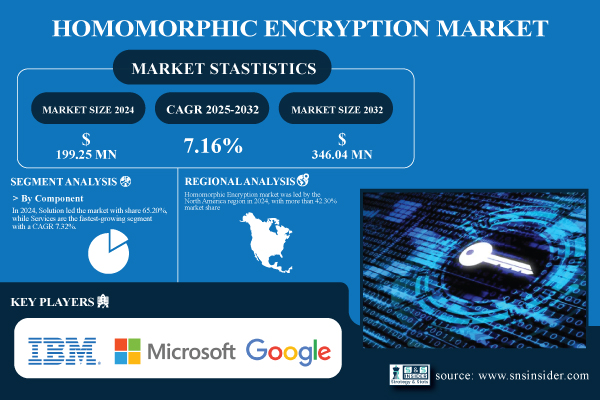
News
September 30, 2025
Homomorphic Encryption Market Projected to Reach USD 346.04 Million by 2032, Driven by the High Demand for Data Privacy & Security in Sensitive Industry | SNS Insider
The global homomorphic encryption market is being driven by the need for data privacy and security in sensitive business sectors including government, healthcare, and BFSI. Growing adoption of homomorphic encryption in BFSI and healthcare for secure data computation. The global homomorphic encryption market is being driven by the need for data privacy and security in sensitive business sectors including government, healthcare, and BFSI. Growing adoption of homomorphic encryption in BFSI and healthcare for secure data computation.
The global homomorphic encryption market is poised for significant growth, with projections estimating a market size of USD 346.04 million by 2032, according to a new report by SNS Insider. This surge is primarily fueled by the increasing demand for robust data privacy and security solutions across highly sensitive industries like government, healthcare, and Banking, Financial Services, and Insurance (BFSI).
In today's digital landscape, data breaches and privacy concerns are paramount. Organizations are under immense pressure to protect sensitive information from unauthorized access and misuse. Homomorphic encryption (HE) offers a groundbreaking solution by allowing computations to be performed on encrypted data without the need to decrypt it first. This ensures that the data remains protected throughout the entire process, even while being processed.
The BFSI sector is rapidly adopting homomorphic encryption to address the challenges of data security and compliance. Financial institutions handle vast amounts of sensitive customer data, making them prime targets for cyberattacks. HE enables them to perform complex financial calculations, such as fraud detection, risk assessment, and credit scoring, on encrypted data without exposing the underlying information. This not only enhances security but also facilitates collaboration and data sharing while maintaining confidentiality.
Similarly, the healthcare industry is embracing homomorphic encryption to safeguard patient data and comply with stringent regulations like HIPAA. HE allows healthcare providers to analyze patient data for research purposes, develop personalized treatment plans, and improve healthcare outcomes, all while preserving patient privacy. This technology is particularly valuable for tasks like genomic analysis, drug discovery, and predictive healthcare modeling, where data sharing and collaboration are essential.
The rising adoption of homomorphic encryption in both BFSI and healthcare sectors for secure data computation is a key driver of market expansion. As organizations across these industries recognize the benefits of HE in enhancing data security, improving compliance, and enabling new data-driven opportunities, the demand for homomorphic encryption solutions is expected to continue to grow exponentially in the coming years. The technology's ability to provide unprecedented levels of data privacy and security is positioning it as a critical tool for organizations operating in sensitive industries.
In today's digital landscape, data breaches and privacy concerns are paramount. Organizations are under immense pressure to protect sensitive information from unauthorized access and misuse. Homomorphic encryption (HE) offers a groundbreaking solution by allowing computations to be performed on encrypted data without the need to decrypt it first. This ensures that the data remains protected throughout the entire process, even while being processed.
The BFSI sector is rapidly adopting homomorphic encryption to address the challenges of data security and compliance. Financial institutions handle vast amounts of sensitive customer data, making them prime targets for cyberattacks. HE enables them to perform complex financial calculations, such as fraud detection, risk assessment, and credit scoring, on encrypted data without exposing the underlying information. This not only enhances security but also facilitates collaboration and data sharing while maintaining confidentiality.
Similarly, the healthcare industry is embracing homomorphic encryption to safeguard patient data and comply with stringent regulations like HIPAA. HE allows healthcare providers to analyze patient data for research purposes, develop personalized treatment plans, and improve healthcare outcomes, all while preserving patient privacy. This technology is particularly valuable for tasks like genomic analysis, drug discovery, and predictive healthcare modeling, where data sharing and collaboration are essential.
The rising adoption of homomorphic encryption in both BFSI and healthcare sectors for secure data computation is a key driver of market expansion. As organizations across these industries recognize the benefits of HE in enhancing data security, improving compliance, and enabling new data-driven opportunities, the demand for homomorphic encryption solutions is expected to continue to grow exponentially in the coming years. The technology's ability to provide unprecedented levels of data privacy and security is positioning it as a critical tool for organizations operating in sensitive industries.
Category:
Technology